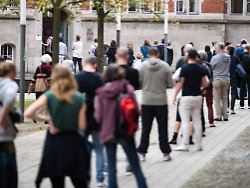Tuesday, September 28, 2021
Senate: There is no repeat event
Berlin is looking for a cause for a chaotic election
Three elections, one referendum, five ballot papers: those who voted in the capital on Sunday had to bring a lot of time with them. The Berlin marathon didn’t help either. The analysis of the errors will probably take even longer, there will probably not be a repetition of the House of Representatives election.
Despite numerous mishaps in Sunday’s elections, the Berlin Senate has so far seen no reason to repeat the House of Representatives election. “From what the Senate has known so far, there are still no indications that there are such serious errors that a re-election is imminent,” said Christian Gaebler, head of the Senate Chancellery, after the Senate meeting. “We should wait quietly until that is analyzed.”
It will take some time to fully clarify the problems. So far, there is no complete overview, said Geert Baasen, head of the office of the regional return officer. Because of the inquiries made to the twelve Berlin districts, which in turn would have to obtain information from the electoral boards of the numerous polling stations, that would not be quick. No result will be available this week.
Gaebler also admitted that the on-site organization had obviously reached its limits in some places. “That will have to be dealt with by the state returning officer and the district returning officers.” When this report is in, the Senate will see where more support is needed in future elections.
Bund refused to postpone the election because of the marathon
In Berlin, where the Bundestag election, elections to the House of Representatives and the district parliaments as well as a referendum were combined, some voters had to wait until well after 6 p.m. on Sunday. Many voters took a long time to get their six crosses because of the five different ballots. In some places voting papers were missing.
In the morning, the Berlin Marathon also ran. Numerous streets were closed for the sporting event on election Sunday. Polling stations that needed more ballot papers were partially delayed in getting their supplies. “From our point of view, the Berlin Marathon was not the main problem,” said Gaebler.
The SPD politician pointed out that it would hardly have been possible to move him. “The Berlin Marathon is part of an international sports calendar and cannot be pushed back and forth at will.” On the other hand, the federal government refused in 2017 and this time to put the election day on another day, said Gaebler. “Which would have been the easier option.” In 2017 there was a Berlin marathon parallel to the general election.
“An alternative would have been to put the Berlin election on an extra date,” said Gaebler. “I think that would have caused a lot of publicity because that would of course involve additional costs.” And the Berliners would have had to vote twice. No one would seriously have wanted to cancel the Berlin Marathon entirely because of the elections, said Gaebler.
The Federal Returning Officer requested a report from the State Returning Authority. A contestation of the election would only be possible after the official final result was established on October 14th. State Returning Officer Petra Michaelis had admitted problems on Monday, but declined personnel consequences. According to the President of the Federal Constitutional Court, Stephan Harbarth, the breakdowns do not inevitably jeopardize the outcome of the Bundestag election. Harbarth told the “Frankfurter Allgemeine Zeitung” that not every deficiency leads to the election being declared invalid. Even if the legal composition of the Bundestag should be affected, an election does not necessarily have to be repeated.
The election observers of the Organization for Security and Cooperation in Europe (OSCE) registered the mishaps during the election in Berlin. The head of the team that observed the federal elections in Germany, Lolita Cigane, told the “editorial network Germany” that they could not draw any conclusions for the whole of Germany from the individual incidents in the polling stations, “because we did not observe all of the polling stations”. The OSCE election observation team was in Berlin with four experts. According to the RND, the OSCE plans to publish its report on the federal election in around a month.
